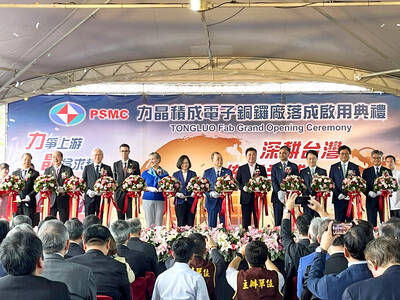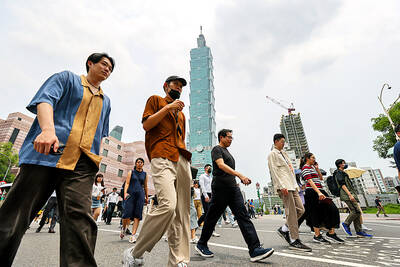Sony Corp yesterday expressed optimism that with the emergence of 5G technology, shipments of its flagship smartphone models would make up 23 percent of the nations’ Android smartphone market this year.
Sony Mobile Taiwan president Jonathan Lin (林志遠) told reporters that the Japanese brand is preparing for the upcoming replacement demand that would accompany the roll out of 5G technology.
Sony’s flagship 5G smartphones, starting at NT$20,000 (US$668), are to be released in Taiwan in first half of this year, Lin said.
Smartphones costing NT$20,000 or more account for 60 percent of the company’s sales in Taiwan and that ratio is expected to increase to 70 percent with the release of its high-end 5G models this year, he said.
“Sony’s goal is to boost the market share of its flagship smartphone models in Taiwan and we are confident of an increase from 15 percent in 2019 to 23 percent this year,” he said.
Sony, with a 15 percent market share, is second only to South Korea’s Samsung Electronics Co in the nation’s high-end Android smartphone market.
Sony is expected to unveil its 5G smartphone models next month at the Mobile World Congress in Barcelona, Spain, and they are to be released in Taiwan in the second quarter of the year, according to local media reports.
Sony is also planning to release mid-range 5G models in Taiwan later this year, and to introduce competitive hardware that would allow new video and audio experiences, attracting more customers, Lin said.
However, while Sony is upbeat about Taiwan’s 5G market, it recognizes that telecoms face the challenge of consumers being deterred by the higher subscription fees for 5G services, he said.
The government’s 5G spectrum auction, which started last month, is still in progress, with fierce competition between the nation’s major telecoms.

ARTIFICIAL INTELLIGENCE: The chipmaker last month raised its capital spending by 28 percent for this year to NT$32 billion from a previous estimate of NT$25 billion Contract chipmaker Powerchip Semiconductor Manufacturing Corp (力積電子) yesterday launched a new 12-inch fab, tapping into advanced chip-on-wafer-on-substrate (CoWoS) packaging technology to support rising demand for artificial intelligence (AI) devices. Powerchip is to offer interposers, one of three parts in CoWoS packaging technology, with shipments scheduled for the second half of this year, Powerchip chairman Frank Huang (黃崇仁) told reporters on the sidelines of a fab inauguration ceremony in the Tongluo Science Park (銅鑼科學園區) in Miaoli County yesterday. “We are working with customers to supply CoWoS-related business, utilizing part of this new fab’s capacity,” Huang said, adding that Powerchip intended to bridge

Microsoft Corp yesterday said that it would create Thailand’s first data center region to boost cloud and artificial intelligence (AI) infrastructure, promising AI training to more than 100,000 people to develop tech. Bangkok is a key economic player in Southeast Asia, but it has lagged behind Indonesia and Singapore when it comes to the tech industry. Thailand has an “incredible opportunity to build a digital-first, AI-powered future,” Microsoft chairman and chief executive officer Satya Nadella said at an event in Bangkok. Data center regions are physical locations that store computing infrastructure, allowing secure and reliable access to cloud platforms. The global embrace of AI

RIDING AI WAVE: : Most of its NT$15bn capital budget would be spent on packaging technologies used in AI and HPC chips and advanced testing technology, it said Chip testing and packaging service provider Powertech Technology Inc (PTI, 力成科技) plans to increase this year’s capital expenditure by 50 percent to expand capacity to meet growing demand for advanced memorychips used in artificial intelligence (AI) products. The company proposed to spend NT$15 billion (US$460.94 million) to expand advanced capacity and equipment, compared with a budget of NT$10 billion it planned three months ago. “We are seeing a recovery in market demand as well as new business opportunities. We will spend heavily on advanced packaging” equipment, Powertech chief executive officer Boris Hsieh (謝永達) told investors on Tuesday. “We will focus on ramping

INFLATION WATCH: A rate hike in March would help keep inflation at 2.16 percent this year, although a weak currency and higher electricity rates are an issue, S&P said Moody’s Ratings and S&P Global Ratings have reaffirmed Taiwan’s sovereign credit ratings at “As3” and “AA+” respectively with a stable outlook on the back of high income and wealth levels, a strong institutional framework and robust external positions. The affirmations came as Taiwan’s economy is gaining momentum after quarters of slowdown induced by stubborn global inflation and monetary tightening. Taiwan’s strong fiscal and external buffers have improved relative to peers as evidenced by recent shocks linked to the COVID-19 pandemic and the ongoing US-China technology dispute, the two ratings firms said. “Taiwan stands as the epicenter of the global semiconductor supply chain, accounting